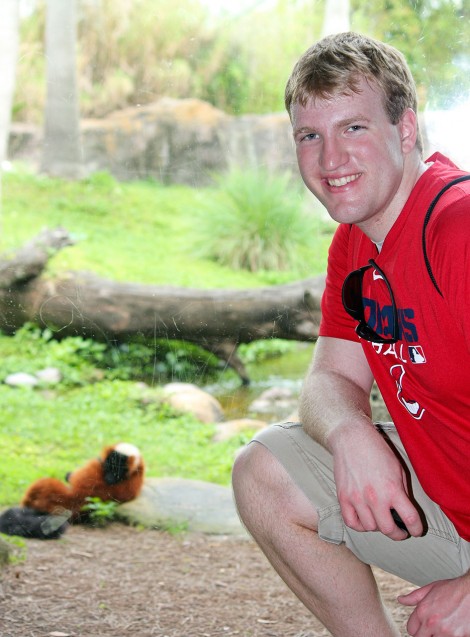
Theory-to-Practice Grant, ‘Saving an Endangered Species’
Learn how OWU’s Course Connections, Travel-Learning Courses, Theory-to-Practice Grants, and other programs prepare students for global citizenship and leadership and help them…Make the Connection.
Using an OWU-funded Theory-to-Practice Grant, Shane Gorbett ’15 traveled to North Carolina, Florida, and Georgia to study how lemurs are cared for in captivity. His goal is to determine how best to protect the endangered species and help lemurs to thrive. (Photo courtesy of Shane Gorbett ’15)
Name: Shane Gorbett ’15
Majors: Pre-Professional Zoology and Spanish
Hometown: Galion, Ohio
Experience: Theory-to-Practice Grant, “Saving an Endangered Species: How U.S. Facilities Manage Lemurs and Their Conservation”
In March 2015, Gorbett traveled to North Carolina, Florida, and Georgia to compare how different facilities manage and care for lemurs and to study whether certain animal care methods are superior for captive lemurs.
Lessons Learned:
“The Theory-to-Practice Grant program was one of the best experiences that I have had at Ohio Wesleyan University. One of the main reasons that I choose to attend Ohio Wesleyan was the vast amount of possibility for travel and research. I have been extremely fortunate to have participated in the Island Biology Travel-Learning course and study abroad in Madagascar; however, the Theory-to-Practice experience was completely unique and greatly added to my time here at Ohio Wesleyan while also preparing me for my future.
“I hope to attend graduate school to obtain a Ph.D. in behavioral ecology and teach at the university level. The Theory-to-Practice Grant program gave me real-life experience in proposing a grant and creating a budget and itinerary.
“As a graduate student I will be proposing grants for funding and travel while also having to create a budget based on the amount of funding that I receive. This was the first experience that I have ever had with proposing a grant and creating a budget, and it was extremely helpful to have the assistance of professors at Ohio Wesleyan to ensure that I created a professional and appropriate proposal. Now I feel confident in my ability to propose grants in the future.
“My Theory-to-Practice experience also has had a huge impact on my academic career and future goals. I studied abroad in Madagascar in the fall of 2014 and since then I have always thought that I wanted to go to Madagascar in order to perform research on lemurs in the wild.
“However, my Theory-to-Practice experience showed me that there are numerous opportunities in the United States to study captive lemurs to help better their conservation. … I always thought that the best way to help conserve a species was to go into the field and study them in the wild; my Theory-to-Practice experience has taught me that studying animals in captivity can be equally as important.
“It is extremely important to know how animals use their environment and what causes stress in an animal in order to construct the best enclosure for the animal as possible. Additionally, sometimes observing animals in captivity can provide insights into behaviors performed in the wild, especially reproduction and the rearing of offspring.
“The Theory-to-Practice experience has opened up a new door for my future and I hope to pursue research on captive lemurs in the future in order to help preserve this incredible species.”
